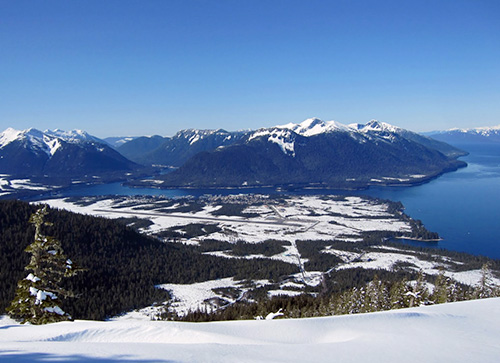
Forest Service Cancels Mitkof Island Timber SaleBy MARY KAUFFMAN
November 20, 2015
Five environmental organizations sued the Forest Service in May 2015 to stop the sale. Those organizations - the Greater Southeast Alaska Conservation Community, Cascadia Wildlands, the Center for Biological Diversity, Greenpeace and the Alaska Wildlife Alliance - are represented by attorneys with Crag Law Center in Portland and Cascadia Wildlands in Cordova.
Mitkof Island, and Petersburg, Alaska
Owen Graham, Executive Director of the Alaska Forest Association, provided a response to the announcement by email to SitNews, "We hope the sale is revised, improved and advertised by early spring so we don't lose another logging season." Graham said, "We were really looking forward to this timber sale, because our timber supply is far short of where we think it should be." Graham explained, the Mitkof project was done as an Environmental Assessment (EA) instead of an Environmental Impact Statement (EIS) in order to save money and time. Graham said one of the purposes of the project was to improve deer browse -"Removing up to 50 percent of the basal area1 of the stand would improve growth of the remaining trees and allow additional light to reach the forest floor, encouraging the growth of wildlife browse." (Pg 5 of the EA) “The agency was forced to walk away from this timber sale because it failed to listen to serious environmental concerns raised by the local community,” said Gabe Scott with Cascadia Wildlands. “If the agency simply intends to redraw the project’s scope, it will still be faced with the same realities about the needs of subsistence hunters and the precarious state of old-growth dependent species on Mitkof Island." The proposed timber sale is located in the center of the Tongass National Forest, near the communities of Petersburg and Kupreanof. Last month the USFS, whose cursory environmental review found that logging the remaining old-growth in the project area would have no significant impact on the forest or wildlife, announced its plan to withdraw the decision to authorize the project. “Mitkof Island has been hard hit by 60 years of industrial logging,” said Becky Knight of Greater Southeast Alaska Conservation Community, a Petersburg resident. “Subsistence hunters from the community rely on deer as a primary source of protein, but for years have been faced with critically low deer populations and severe harvest restrictions. This area of the Tongass needs a long period of recovery, but this sale targeted some of the few remaining stands of important winter deer habitat." “While planning for this sale, the Forest Service tried to downplay and hide from the public the full scope of the damage this logging would cause,” said Randi Spivak at the Center for Biological Diversity. “The agency initially told the public this was a ‘small sale’ but the project ballooned into a major timber sale. Old-growth logging needs to end now.” “The Forest Service must take a hard look at the environmental consequences of its actions, especially with respect to species like the deer and the goshawk that depend on old-growth forests,” said Oliver Stiefel of Crag Law Center. “In a rush to approve yet another major old-growth timber sale, the Tongass National Forest brushed aside these environmental concerns and fast-tracked the project.” The Mitkof Island Project's plan was to provide units for small timber sales, a one-time predominantly helicopter-based offering with a limited number of ground-based harvest units requiring road construction, and supported a programmatic microsale program on Mitkof Island.
On the Web:
Related News:
Source of News:
|
||
